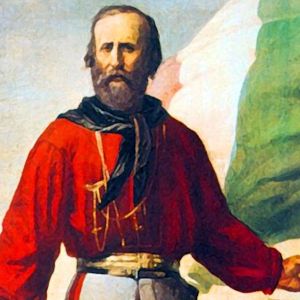The Hero of the Two Worlds
Giuseppe Garibaldi was born in Nice on 4th July 1807. A restless character and eager for adventure, from a very young age he frequented San Remo on Captain Angelo Pesante's brig 'Costanza', embarked as a sailor to undertake life at sea. In 1832, when he was only twenty-five years old, he was captain of a merchant ship and in the same period he began to approach the European and Italian patriotic movements (such as, for example, the Mazzini's "Giovine Italia"), and to embrace their ideals of freedom and independence.
In 1832, when he was only twenty-five years old, he was captain of a merchant ship and in the same period he began to approach the European and Italian patriotic movements (such as, for example, the Mazzini's "Giovine Italia"), and to embrace their ideals of freedom and independence.
In 1836 he landed in Rio de Janeiro and from here began the period, which lasted until 1848, in which he engaged in various war enterprises in Latin America.
He fought in Brazil and Uruguay and accumulated great experience in guerrilla tactics based on movement and surprise actions. This experience will be of great value for the formation of Giuseppe Garibaldi both as a leader of men and as an unpredictable tactician.
In 1848 he returned to Italy where the independence uprisings broke out, which saw the famous Five Days of Milan.
On 26 September 1848, in transit from Sanremo, from the window of the house of the Heavy in Pian di Nave, he exhorted the citizens not to despair in the destinies of the Homeland. In 1849 he took part in the defence of the Roman Republic together with Mazzini, Pisacane, Mameli and Manara, and was the soul of the Republican forces during the fighting against the French allies of Pope Pius IX. Unfortunately the Republicans had to give in to the preponderance of the enemy forces and Garibaldi had to abandon Rome on 2 July 1849.
In 1849 he took part in the defence of the Roman Republic together with Mazzini, Pisacane, Mameli and Manara, and was the soul of the Republican forces during the fighting against the French allies of Pope Pius IX. Unfortunately the Republicans had to give in to the preponderance of the enemy forces and Garibaldi had to abandon Rome on 2 July 1849.
From here, passing through very dangerous roads along which he lost many faithful companions, including his beloved wife Anita, he managed to reach the territory of the Kingdom of Sardinia.
He then began a period of wandering around the world, mostly by sea, which finally brought him to Caprera in 1857.
Garibaldi, however, did not abandon his unitary ideals and in 1858-1859 he met Cavour and Vittorio Emanuele, who authorised him to set up a corps of volunteers, a corps that was called "Cacciatori delle Alpi" and under whose command Garibaldi himself was placed.
He took part in the Second War of Independence, gaining various successes but the armistice of Villafranca, while winning, interrupted its operations and those of its Hunters with the famous word in response to the halt: "I obey".
In 1860, before the Expedition of the Thousand, also in Sanremo On 14th April 1860, after the passage of Nice to France, he accepted the Sanremo citizenship with the following words: « I accept with gratitude the honourable title which counts me among the citizens of Sanremo, from whom I learned at a very young age to despise the dangers of the sea... As a citizen of San Remo, I will certainly promote the just claims of my adopted city to this end ».
On 6 May 1860 he sailed from Quarto (GE) and landed in Marsala five days later. From Marsala he began his triumphal march; he beat the Bourbons at Calatafimi, reached Milazzo, took Palermo, Messina, Syracuse and completely liberated Sicily.
On 19th August he landed in Calabria and, moving very quickly, he threw the Bourbons into turmoil, conquered Reggio, Cosenza, Salerno; on 7th September he entered Naples, abandoned by King Francis II and finally defeated the Bourbons on the Volturno.
On October 26th Garibaldi met in Vairano with Vittorio Emanuele II and placed the conquered territories in his hands: he then retired again to Caprera, always ready to fight for national ideals.
In 1862 he led an expedition of volunteers in order to free Rome from the papal government, but the enterprise was opposed by the Piedmontese, who stopped him on 29 August 1862 in Aspromonte, where he was also wounded.
Imprisoned and then freed, he took refuge again on Caprera, while remaining in contact with the patriotic movements in Europe.
In 1866 he took part in the Third War of Independence under the command of Volunteer Wards. He operated in Trentino and here he gained the victory of Bezzecca (21 July 1866) but, despite the favourable situation in which he had set himself against the Austrians, Garibaldi had to evacuate the Trentino territory by order of the Piedmontese, to whose dispatch he replied with that "Obbedisco", which remained famous.
In 1867 he was again at the head of an expedition that aimed at the liberation of Rome, but the attempt failed with the defeat of Garibaldi's forces in Mentana at the hands of the Franco-Pontifici.
In 1871 he took part in his last war venture by fighting for the French in the Franco-Prussian war where, although he managed to capture some successes, nothing could prevent the final defeat of France.
He finally returned to Caprera, where he spent his last years and where he died on 2 June 1882.
(Source: Biografieonline)




